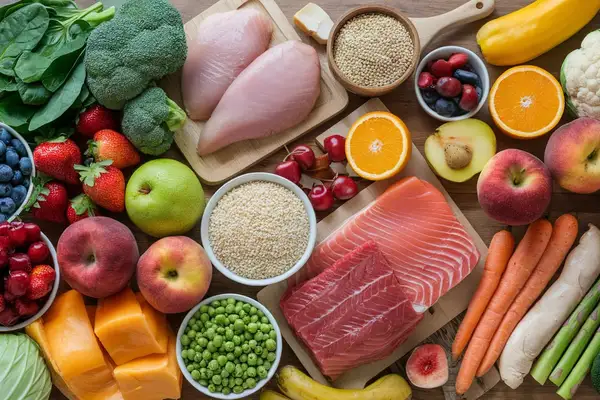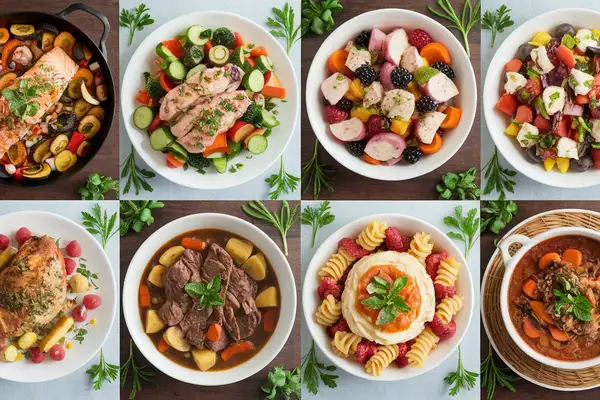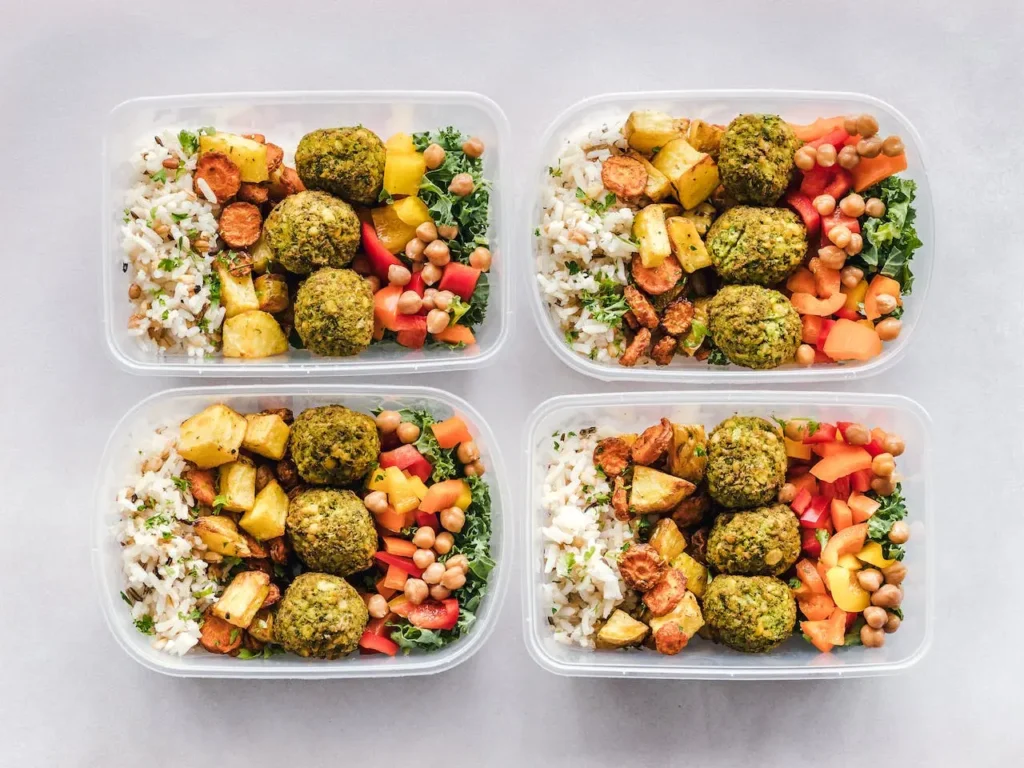7-Day Endometriosis Diet Plan | Adenomyosis Diet
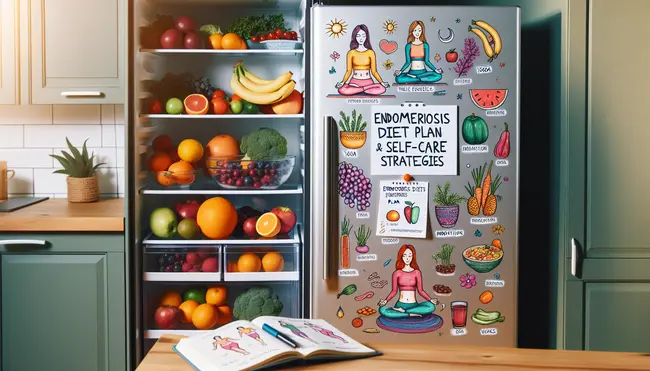
- What is Endometriosis?
- The Endometriosis Diet Plan: What to Eat and Avoid
- What to Eat: Foods to Help with Endometriosis Pain
- Worst Foods for Adenomyosis
- 7-Day Endometriosis Diet Plan (Adenomyosis Diet)
- Endometriosis Self Care Strategies
- Best Supplements for Adenomyosis
- Can Adenomyosis Cause Weight Gain
- Resources
- Conclusion
- FAQs
What is Endometriosis?
This post may contain affiliate links, meaning I may earn a commission if you make a purchase, at no extra cost to you. I only recommend products I trust. Thank you for your support.
Endometriosis or adenomyosis is a chronic medical condition in which tissue similar to the lining of the uterus, known as the endometrium, grows outside the uterus.
This abnormal tissue can develop on the ovaries, fallopian tubes, outer surface of the uterus, and other organs within the pelvic cavity.
Unlike the normal endometrium that sheds during menstruation, the misplaced tissue continues to act like uterine lining, thickening and attempting to shed each menstrual cycle.
Endometriosis or adenomyosis affects approximately 10% of women (up to 190 million women and girls) in their reproductive years, presenting a significant health challenge.
On average, women may experience symptoms for up to 8 to 12 years before receiving an accurate diagnosis, particularly in regions like the UK, Australia, and the USA.
While there is no cure for endometriosis, there are ways to manage its symptoms, and one important aspect of managing endometriosis is through a proper adenomyosis diet.
An endometriosis diet, emphasizing anti-inflammatory foods has emerged as a potential ally in managing this condition, calling for more targeted research to understand its true impact.
This article explores how adopting an endometriosis diet focusing on low glycemic index foods, omega-3 fats, and gluten-free options can relieve pain and potentially reduce endometriosis symptoms.
Additionally, we shall provide you with a comprehensive 7-day anti inflammatory diet for adenomyosis, foods to help with endometriosis pain, endometriosis diet recipes, and adenomyosis self-care strategies for those affected by this condition.
The Endometriosis Diet Plan: What to Eat and Avoid
For those experiencing symptoms similar to irritable bowel syndrome (IBS) alongside endometriosis, following a low-FODMAP diet may provide relief.
Incorporating foods to help with endometriosis pain into your daily meals can make a significant difference in managing endometriosis symptoms.
On the other hand, certain foods should be avoided as they can trigger inflammation and worsen symptoms.
What to Eat: Foods to Help with Endometriosis Pain
When curating an endometriosis diet grocery list, it’s essential to focus on foods that are known to have anti-inflammatory properties and may help alleviate symptoms associated with the condition.
Here’s a detailed breakdown of foods to include in an endometriosis diet:
1. Fresh Produce
Prioritize low-starch and low-sugar fruits and vegetables to help manage inflammation associated with endometriosis and whenever possible, opting for organic produce can be beneficial.
2. Fruits and Vegetables
- Berries: Blueberries, raspberries, and strawberries are rich in antioxidants and may help reduce inflammation.
- Leafy Greens: Spinach, kale, and Swiss chard are high in vitamins and minerals that support overall health.
- Cruciferous Vegetables: Broccoli, cabbage, brussels sprouts, spinach, lettuce, and cauliflower contain compounds that may help the body metabolize estrogen more effectively.
- Citrus Fruits: Oranges, limes, grapefruits, and lemons are rich in vitamin C, an essential nutrient that supports the immune system and acts as an antioxidant in the body.
- Root Vegetables: Sweet potatoes, carrots, and beets are rich in nutrients like vitamins (especially vitamin A and vitamin C), minerals, fiber, and antioxidants.
- Zucchini and Squash: These vegetables are low in FODMAPs and can be included in a well-rounded diet for individuals with endometriosis.
- Bell Peppers: Red, yellow, and green bell peppers are rich in antioxidants like vitamin C and can be a flavorful addition to meals.
3. Healthy Fats
- Avocado: Contains monounsaturated fats and may help reduce inflammation.
- Fatty Fish: Salmon, haddock, mackerel, and herring are high in omega-3 fatty acids, which have anti-inflammatory properties.
- Nuts and Seeds: Almonds, walnuts, chia seeds, and flaxseeds are good sources of healthy fats and fiber.
4. Whole Grains
- Quinoa: A gluten-free whole grain that is high in protein and fiber.
- Brown Rice: Rich in fiber and may help regulate estrogen levels.
- Gluten-Free Oats: Contains soluble fiber and may help with overall digestive health.
5. Lean Protein
Lean protein choices should focus on reducing inflammatory responses and supporting hormonal balance:
- Chicken: A good source of lean protein.
- Tofu: A plant-based source of protein and may provide phytoestrogens that could help balance estrogen levels.
- Turkey: Like chicken, turkey is a good source of lean protein.
- Legumes: Lentils, chickpeas, and black beans are high in protein and fiber.
- Bone broths: Are rich in nutrients and help in healing the gut.
- 100% grass-fed or organic meats and pastured eggs to avoid hormones.
- Collagen-rich cuts, organ meats, and meat on the bone.
- Canned options such as anchovies, salmon, and sardines.
6. Herbs and Spices
- Turmeric: Contains curcumin, which has anti-inflammatory properties.
- Wild Yam Cream: May slow the overgrowth of the endometrium, thus helping those with endometriosis.
- Chamomile: renowned for its anti-inflammatory properties, can alleviate endometrial pain and cramps effectively.
- Ginger: Known for its anti-inflammatory and antioxidant effects.
- Cinnamon: May help regulate blood sugar levels and reduce inflammation.
- Parsley: Contains compounds such as flavonoids and volatile oils that have anti-inflammatory effects.
- Mushrooms: Certain compounds such as polysaccharides and antioxidants, may have anti-inflammatory properties.
7. Herbal Teas
- Chamomile: Known for its calming effects and may help with pain management.
- Peppermint: Can aid in digestion and reduce bloating.
- Green Tea: Contains Epigallocatechin-3-Gallate (EGCG), which helps in blocking aromatase and impeding angiogenesis processes important in the progression of endometriosis.
8. Additional Nutrients
Including foods rich in specific nutrients can further help manage endometriosis symptoms:
- Isoflavones: Found in soybeans, chickpeas, fava beans, and nuts like pistachios and peanuts.
- Probiotics: From yogurt, pickles, kombucha, tempeh, kimchi, miso, and kefir to support gut health.
- Prebiotic Foods: Bananas, oats, apples, asparagus, leeks, onions, and garlic to feed beneficial gut bacteria.
- Resveratrol: Sources such as grapes, peanuts, cocoa, and dark chocolate to help reduce inflammation.
Worst Foods for Adenomyosis
Individuals managing endometriosis may find relief by adjusting their diet to exclude certain foods that can exacerbate symptoms.
Here’s a detailed overview of foods to avoid with endometriosis:
1. Gluten and Dairy Products
These gluten-containing foods can cause hormone imbalances and inflammation while dairy products are often high in hormones and antibiotics, which can worsen endometriosis symptoms.
- Gluten-containing foods: Wheat-based products like bread, pasta, and cereals.
- Dairy products: Cow’s milk, cheese, yogurt, and ice cream.
2. Red and Processed Meats
Research studies have shown that excessive consumption of red meat has been linked to a higher risk of developing endometriosis.
- Red meats: Beef, lamb, and pork.
- Processed meats: Hot dogs, sausages, bacon, and deli meats.
3. Fats and Sugary Foods
Dietary fat consumption especially trans fats are particularly harmful and have been associated with higher rates of endometriosis.
Foods high in omega-6 fatty acids and sugary foods can increase the production of pro-inflammatory agents, worsening pain and inflammation.
- Trans fats: Margarine, fried foods, and commercially baked goods.
- Omega-6 fatty acids: Vegetable oils like soybean oil, corn oil, and sunflower oil.
- Sugary foods: Soda, candy, pastries, and sugary cereals.
4. Alcohol and Caffeine
Alcohol consumption should be minimized as it can increase estrogen levels and lead to inflammation. It is advisable to limit intake to one or two drinks per week.
Similarly, excessive caffeine intake can aggravate the digestive system and should not exceed 200-400 mg per day.
- Alcohol: Beer, wine, spirits, and cocktails.
- Caffeine: Coffee, tea, energy drinks, and some sodas.
7-Day Endometriosis Diet Plan (Adenomyosis Diet)
This 7-day endometriosis diet plan includes anti-inflammatory foods rich in antioxidants, omega-3 fatty acids, and fiber, all tailored to help alleviate symptoms associated with endometriosis or adenomyosis.
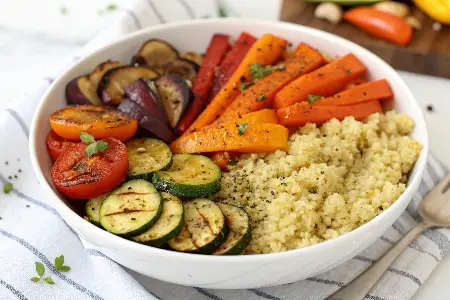
Day 1
Breakfast:
- Turmeric Ginger Smoothie Bowl: Blend almond milk, turmeric, ginger, banana, blueberries, and spinach. Top with chia seeds and sliced almonds. (1 cup almond milk, ½ tsp turmeric, ½ inch ginger, 1 banana, ½ cup blueberries, 1 cup spinach, 1 tbsp chia seeds, 1 tbsp sliced almonds)
Lunch:
- Quinoa & Roasted Vegetable Salad: Toss cooked quinoa with roasted bell peppers, zucchini, red onion, and arugula, dressed in a lemon-tahini vinaigrette. (1 cup quinoa, 1 cup mixed roasted vegetables, 2 cups arugula, 2 tbsp lemon-tahini dressing)
Dinner:
- Herb-Crusted Cod with Steamed Broccoli: Bake cod with fresh herbs and lemon zest; serve with steamed broccoli lightly drizzled with olive oil. (6 oz cod, 1 cup broccoli, 1 tsp mixed herbs, 1 tsp olive oil)
Snacks:
- Apple Slices with Almond Butter: Crisp apple slices paired with almond butter. (1 medium apple, 2 tbsp almond butter)
- Roasted Chickpeas: Crunchy roasted chickpeas seasoned with paprika and garlic powder. (½ cup chickpeas)

Day 2
Breakfast:
- Overnight Oats with Berries & Flaxseed: Combine rolled oats with almond milk, chia seeds, mixed berries, and a dash of cinnamon overnight. (½ cup oats, 1 cup almond milk, 1 tbsp chia seeds, ½ cup mixed berries, ¼ tsp cinnamon, 1 tsp flaxseed)
Lunch:
- Lentil & Spinach Soup: A warming soup with hearty lentils, diced tomatoes, fresh spinach, and aromatic spices. (1 cup lentils, 2 cups spinach, 1 cup diced tomatoes, herbs and spices to taste)
Dinner:
- Turmeric Chicken Stir-Fry: Sauté chicken breast with broccoli, carrots, and bell peppers in a turmeric-garlic sauce. (6 oz chicken breast, 1 cup broccoli, 1 medium carrot, 1 bell pepper, ½ tsp turmeric, garlic to taste)
Snacks:
- Cucumber Slices with Hummus: Crisp cucumber rounds with a side of classic hummus. (1 medium cucumber, ¼ cup hummus)
- Mixed Nuts: A handful of antioxidant-rich walnuts, almonds, and pistachios. (1 oz mixed nuts)
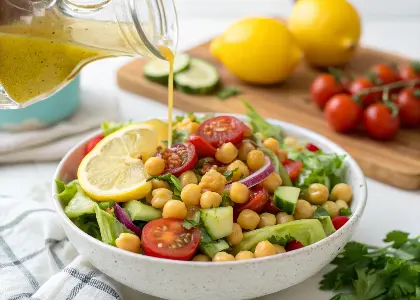
Day 3
Breakfast:
- Avocado Toast on Gluten-Free Bread: Creamy mashed avocado spread on toasted gluten-free bread, topped with cherry tomatoes and hemp seeds. (1 slice gluten-free bread, ½ avocado, 5 cherry tomatoes, 1 tsp hemp seeds)
Lunch:
- Chickpea Salad with Lemon Vinaigrette: Mix chickpeas, diced cucumber, red bell pepper, red onion, and parsley with a zesty lemon dressing. (1 cup chickpeas, ½ cucumber, ½ red bell pepper, a few slices red onion, a handful of parsley, juice of 1 lemon, olive oil)
Dinner:
- Baked Turkey Meatballs with Zucchini Noodles: Herb-infused turkey meatballs served over zucchini noodles with a light tomato basil sauce. (5 meatballs, 2 cups zucchini noodles, ½ cup tomato basil sauce)
Snacks:
- Kale Chips: Oven-baked kale crisps sprinkled with sea salt. (1 cup kale)
- Fresh Pear Slices: Juicy pear slices perfect for a sweet snack. (1 medium pear)

Day 4
Breakfast:
- Green Detox Smoothie: Blend kale, cucumber, apple, lemon, and ginger with refreshing coconut water. (1 cup kale, ½ cucumber, 1 small apple, juice of 1 lemon, ½ inch ginger, 1 cup coconut water)
Lunch:
- Wild Rice Salad with Edamame & Carrots: Combine wild rice with edamame, shredded carrots, and red cabbage, tossed in a sesame-ginger dressing. (1 cup wild rice, ½ cup edamame, 1 medium carrot, ½ cup shredded red cabbage, 1 tbsp sesame-ginger dressing)
Dinner:
- Seared Tofu with Stir-Fried Bok Choy: Marinated tofu, seared until golden, served with garlic stir-fried bok choy. (6 oz tofu, 1 cup bok choy, 1 clove garlic, a splash of tamari sauce)
Snacks:
- Sliced Bell Peppers with Guacamole: Crisp bell pepper strips dipped in zesty guacamole. (1 medium bell pepper, ¼ cup guacamole)
- Sunflower Seeds: A small bowl of roasted sunflower seeds. (1 oz sunflower seeds)

Day 5
Breakfast:
- Berry & Chia Pudding: A creamy chia pudding made with almond milk and layered with fresh mixed berries. (3 tbsp chia seeds, 1 cup almond milk, ½ cup mixed berries)
Lunch:
- Grilled Shrimp Salad with Avocado: Lightly grilled shrimp tossed with mixed greens, avocado slices, and a citrus dressing. (6 oz shrimp, 2 cups mixed greens, ½ avocado, 2 tbsp citrus dressing)
Dinner:
- Stuffed Bell Peppers: Bell peppers filled with a savory mix of brown rice, black beans, corn, tomatoes, and herbs, baked to perfection. (2 bell peppers, 1 cup brown rice, ½ cup black beans, ½ cup corn, 1 cup diced tomatoes, herbs to taste)
Snacks:
- Carrot Sticks with Tahini Dip: Crunchy carrot sticks paired with a creamy tahini dip. (1 cup carrot sticks, 2 tbsp tahini)
- Fresh Orange Slices: Juicy orange wedges to refresh your palate. (1 medium orange)

Day 6
Breakfast:
- Quinoa Porridge with Almonds & Cinnamon: Warm quinoa simmered with almond milk, finished with chopped almonds and a dusting of cinnamon. (1 cup cooked quinoa, 1 cup almond milk, 1 tbsp almonds, ½ tsp cinnamon)
Lunch:
- Beet & Goat Cheese Salad: Roasted beets paired with arugula, walnuts, and crumbled goat cheese drizzled with a balsamic reduction. (2 medium beets, 2 cups arugula, 1 oz walnuts, 1 oz goat cheese, 1 tbsp balsamic vinegar)
Dinner:
- Lemon Herb Grilled Cod with Quinoa Pilaf: Cod grilled with lemon and herbs, served alongside a quinoa pilaf and steamed green beans. (6 oz cod, 1 cup quinoa pilaf, 1 cup green beans, lemon zest)
Snacks:
- Steamed Edamame Pods: Lightly salted edamame for a protein boost. (½ cup edamame pods)
- Apple Slices with Walnuts: Crisp apple slices topped with chopped walnuts. (1 apple, 1 oz walnuts)

Day 7
Breakfast:
- Sweet Potato & Black Bean Breakfast Hash: Sautéed sweet potatoes with black beans, red bell peppers, and spinach spiced with cumin and paprika. (1 medium sweet potato, ½ cup black beans, ½ red bell pepper, 1 cup spinach, spices to taste)
Lunch:
- Spinach & Strawberry Salad: Fresh spinach leaves tossed with sliced strawberries, avocado, and almonds, all drizzled with a raspberry vinaigrette. (2 cups spinach, ½ cup sliced strawberries, ½ avocado, 1 oz almonds, 2 tbsp raspberry vinaigrette)
Dinner:
- Miso-Glazed Eggplant with Brown Rice: Oven-roasted eggplant brushed with a miso glaze, served over steamed brown rice with a side of sautéed kale. (1 medium eggplant, 1 tbsp miso glaze, 1 cup brown rice, 1 cup kale)
Snacks:
- Mixed Berry Bowl: A refreshing bowl of mixed berries to satisfy your sweet cravings. (1 cup mixed berries)
- Pumpkin Seeds: A small handful of nutrient-dense pumpkin seeds. (1 oz pumpkin seeds)
Endometriosis Self Care Strategies
Managing endometriosis involves not only medical treatments but also self-care strategies that can help alleviate symptoms and improve overall well-being.
Here are 10 endometriosis self-care strategies:
1. Regular Exercise
- Engaging in low-impact exercises like walking, yoga, or swimming can help reduce stress, improve circulation, and alleviate endometriosis-related pain.
2. Healthy Diet
- Consuming a balanced diet rich in fruits, vegetables, whole grains, lean proteins, and healthy fats can help reduce inflammation and manage endometriosis symptoms.
3. Stress Management
- Practicing stress-reducing techniques such as mindfulness meditation, deep breathing exercises, and progressive muscle relaxation can help manage pain and improve overall quality of life.
4. Heat Therapy
- Applying a heating pad or taking a warm bath can help relax muscles and alleviate pelvic pain associated with endometriosis.
5. Adequate Rest
- Getting enough sleep by aiming for 7-9 hours of quality sleep each night to support hormone balance and reduce fatigue.
6. Support Network
- Connecting with others who understand the challenges of living with endometriosis can provide emotional support and valuable coping strategies.
7. Pelvic Floor Therapy
- For individuals with pelvic pain, pelvic floor physical therapy can help alleviate discomfort and improve pelvic muscle function.
8. Pain Management Techniques
- Learning and practicing pain management techniques such as acupuncture, acupressure, or transcutaneous electrical nerve stimulation (TENS) can help manage endometriosis-related pain.
9. Regular Medical Check-ups
- Regularly consulting with healthcare providers and gynecologists to monitor the condition and discuss treatment options is crucial for managing endometriosis.
Best Supplements for Adenomyosis
While a well-balanced endometriosis diet is crucial for managing endometriosis, some individuals may consider incorporating certain supplements to complement their dietary intake.
However, it’s important to consult with a healthcare professional or a registered dietitian before introducing any new supplements.
Here are some supplements that are commonly considered for an endometriosis diet:
- Omega-3 Fatty Acids: Known for regulating pain and inflammation, which are common issues for individuals with endometriosis.
- Vitamin D: Some research suggests that vitamin D may play a role in immune function and inflammation regulation.
- Curcumin (Turmeric Extract): Recognized for its anti-inflammatory and antioxidant properties, which may help manage endometriosis symptoms.
- N-acetylcysteine (NAC): Has shown potential in reducing pain and lesion size in experimental models, although more research is needed for human dosages.
- Epigallocatechin-3-gallate (EGCG): Found in green tea, studied for reducing endometriosis lesion size, but human dosages require further research.
- Zinc: Its antioxidant properties may benefit those with endometriosis by managing inflammation levels.
- Magnesium: Discussed for its potential to reduce the risk of endometriosis through dietary intake, highlighting the importance of nutrient sources for reproductive health.
- Vitex (Chaste Tree Berry): Believed to help regulate hormone levels, particularly by supporting the balance of estrogen and progesterone.
- Iron: Iron supplementation may be necessary for those with iron-deficiency anemia due to heavy periods associated with endometriosis.
- Probiotics: Probiotics support gut health and overall immune function, which can be beneficial for individuals managing digestive symptoms related to endometriosis.
Can Adenomyosis Cause Weight Gain
Yes, adenomyosis or endometriosis is known to indirectly contribute to weight gain through several mechanisms.
These mechanisms include:
- Inflammation: The chronic inflammation associated with endometriosis can disrupt metabolic processes and lead to weight fluctuations.
- Hormonal Imbalances: Elevated estrogen levels in endometriosis can disrupt the body’s ability to regulate weight.
- Medication: Certain medications used to manage endometriosis symptoms, such as hormonal birth control, can lead to weight gain.
- Post-Hysterectomy Changes: In cases where a hysterectomy is performed, especially involving ovary removal, menopausal symptoms like weight gain may occur due to hormonal adjustments.
- Metabolic Impact: Endometriosis can impact metabolism, leading to factors like insulin resistance, metabolic syndrome risk, thyroid imbalances, and changes in adipose tissue resulting in weight accumulation around the abdominal area.
- Fluid Retention: Endometriosis commonly causes severe abdominal bloating, often referred to as “endo belly,” which can visually resemble weight gain.
Resources
Navigating endometriosis can be challenging, but you don’t have to do it alone. There are many resources available to provide support, information, and guidance.
Here are some valuable resources for managing an endometriosis diet:
- Endometriosis Foundation of America: A non-profit organization dedicated to increasing awareness, education, and research for endometriosis.
- Endometriosis UK: A UK-based charity that offers support, information, and resources for women with endometriosis.
- The Endometriosis Network Canada: A Canadian organization that offers support, education, and advocacy for women with endometriosis.
- MyEndometriosisTeam: An online community where women with endometriosis can connect, ask questions, and share experiences.
Conclusion
Through exploring the significance of a tailored endometriosis diet plan and comprehensive self-care strategies, this article underscores the potential for individuals to mitigate the debilitating effects of endometriosis.
This endometriosis meal plan or adenomyosis diet plan is designed to help manage symptoms by focusing on anti-inflammatory foods, balancing hormones, and supporting overall health.
Emphasizing anti inflammation foods, including foods to help with endometriosis pain, and adenomyosis self-care strategies offer a multifaceted approach to managing symptoms and enhancing quality of life.
It is clear that while there is no one-size-fits-all solution, empowerment through informed choices about the endometriosis diet, lifestyle adjustments, and supplementary treatments can provide meaningful relief.
Remember, each person’s experience with endometriosis is unique, so it’s important to consult with a healthcare professional to develop a personalized plan that meets your specific needs.
With the right tools and support, you can take control of your endometriosis and live a fulfilling life.
Other helpful articles:
- High protein meal plan for weight loss
- Foods to avoid with trulicity
- Low potassium diet menu for kidney patients
- 3000 calorie meal plan
- 7-day meal plan for prediabetes
- 7 day meal plan for gestational diabetes
- 7-day meal plan for pregnant women
- 7-day PCOS diet meal plan
- Elimination diet 7-day meal plan
- The menopause diet 5 day plan to lose weight
- How long does it take to reverse prediabetes
- 100 low fodmap snack ideas
- 7-day meal plan for pancreatitis
- 7-day meal plan for gastritis
- 7-day meal plan for ulcerative colitis
FAQs
What dietary changes can help manage endometriosis?
Reducing the intake of dietary fats and increasing fiber can be beneficial for managing endometriosis, as these changes may help lower circulating estrogen levels, a key factor in the condition.
Additionally, it is advisable to limit red meat consumption, as higher red meat intake has been linked to an increased risk of developing endometriosis.
Can a diet alone cure endometriosis?
While diet can play a significant role in managing endometriosis symptoms, it cannot cure the condition.
Endometriosis is a complex condition with various contributing factors, and a multidisciplinary approach that includes medical intervention is often necessary.
Can an endometriosis diet help with fertility?
There is evidence to suggest that a healthy diet can improve fertility outcomes for women with endometriosis.
A well-balanced endometriosis diet that supports hormone balance and reduces inflammation can create a favorable environment for conception.
How long does it take to see improvements with an endometriosis diet?
The timeline for seeing improvements with an endometriosis diet can vary from person to person.
Some women may notice changes within a few weeks, while others may take several months to experience noticeable improvements.

